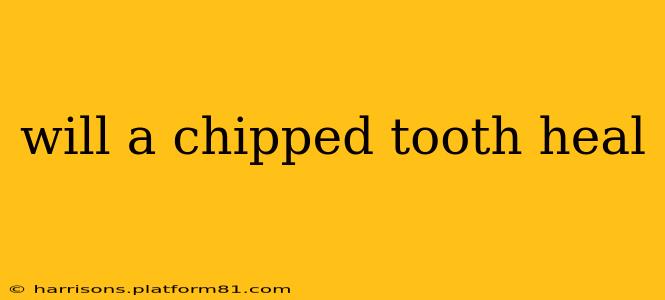A chipped tooth is a common dental injury, often caused by falls, sports accidents, or biting into hard objects. While a chipped tooth won't heal itself in the same way a broken bone does, there are various ways to repair the damage and restore its appearance and function. Whether or not a chipped tooth needs treatment depends on the severity of the chip. Let's explore this further.
What Happens When a Tooth Chips?
When a tooth chips, the enamel and potentially the dentin (the layer beneath the enamel) are exposed. The extent of the damage determines the necessary treatment. Minor chips may only affect the enamel, while more severe chips can reach the dentin or even the pulp (the innermost part of the tooth containing nerves and blood vessels). Infection is a significant concern if the pulp is exposed.
Can a Minor Chip Heal on Its Own?
No, a chipped tooth will not heal itself. The enamel, the hardest substance in the human body, doesn't have the capacity for self-repair. While a very small, superficial chip might not require immediate treatment, it's crucial to monitor it for any signs of worsening or sensitivity. Ignoring a chip can lead to increased sensitivity, further chipping, cracking, or even infection.
How Are Chipped Teeth Repaired?
The repair method depends on the severity of the chip:
-
Minor Chips: These can often be smoothed and polished by a dentist to prevent further damage and discomfort. Sometimes, bonding – applying a tooth-colored resin to fill the chip – is used for a seamless repair.
-
Moderate Chips: For larger chips that affect the dentin, a dentist might use bonding or a filling material to restore the tooth's shape and function.
-
Severe Chips: If a significant portion of the tooth is chipped or the pulp is exposed, more extensive procedures like a crown (a cap placed over the tooth) or root canal treatment (to remove infected pulp) might be necessary.
What are the Long-Term Effects of an Untreated Chipped Tooth?
Ignoring a chipped tooth can have several negative consequences:
- Increased Sensitivity: Exposed dentin makes the tooth more sensitive to hot and cold temperatures, as well as sweet and acidic foods.
- Further Damage: The chip can become larger or the tooth can crack further, potentially requiring more extensive and costly treatment.
- Infection: If the pulp is exposed, bacteria can enter the tooth, leading to infection, abscess formation, and even tooth loss.
How Can I Prevent Chipped Teeth?
Preventing chipped teeth involves taking precautions:
- Wear a Mouthguard: If you participate in contact sports, wear a mouthguard to protect your teeth from impact.
- Avoid Biting Hard Objects: Refrain from biting hard candies, ice, or pen caps.
- Practice Good Oral Hygiene: Maintaining good oral hygiene helps strengthen teeth and reduces the risk of fractures.
What Should I Do if I Chip a Tooth?
If you chip a tooth, see a dentist as soon as possible. They can assess the damage, determine the best treatment option, and address any immediate concerns. Rinse your mouth with warm salt water and apply a cold compress to reduce swelling if needed. If bleeding is significant, apply direct pressure to the area.
Does a Chipped Tooth Affect My Bite?
Yes, a chipped tooth can affect your bite. A significant chip can alter the way your teeth meet, leading to uneven wear, jaw pain (TMJ issues), or headaches. Your dentist will assess this during your examination.
Will Insurance Cover Chipped Tooth Repair?
Most dental insurance plans cover at least some portion of chipped tooth repair, but the exact coverage depends on your specific plan. Check your policy details or contact your insurance provider to understand your benefits.
By understanding the causes, consequences, and treatments for chipped teeth, you can take proactive steps to protect your dental health and address any injuries promptly. Remember, a dentist is your best resource for diagnosis and treatment.
